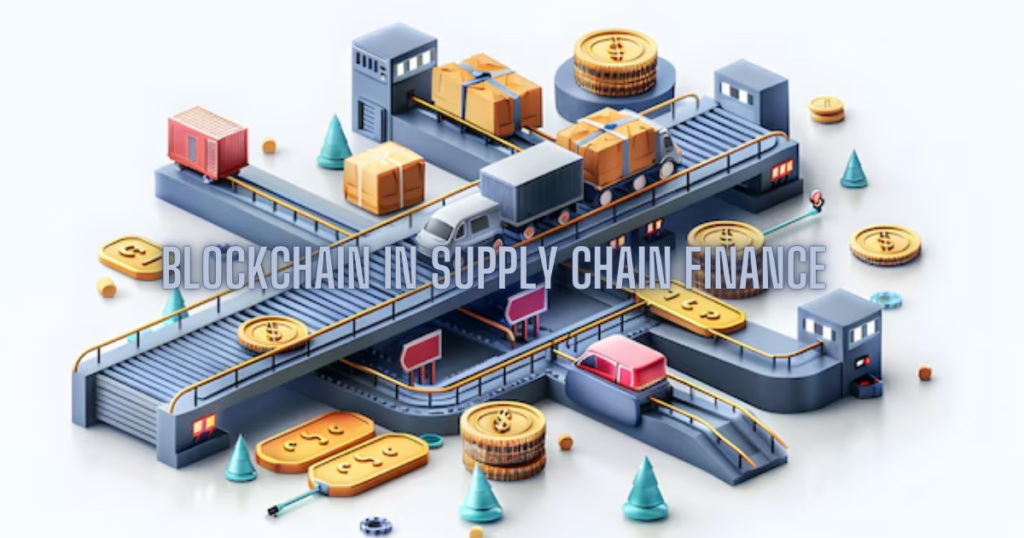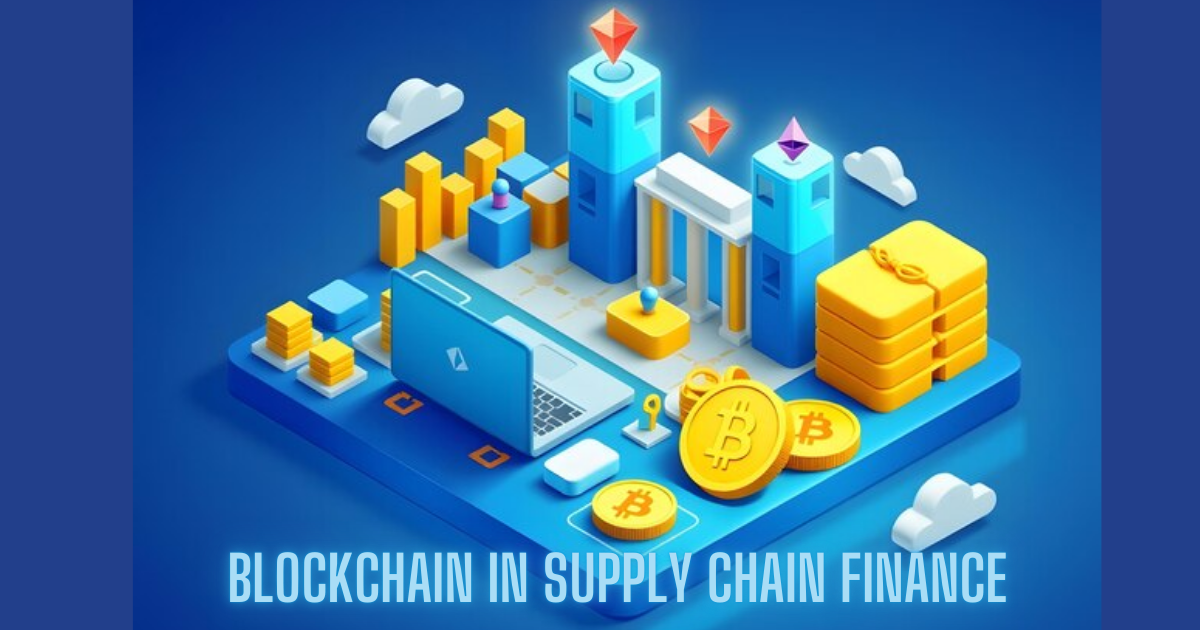Blockchain in Supply Chain Finance-In today’s rapidly evolving business environment, blockchain technology is making waves. It is especially impactful in the field of supply chain finance. This article explores how blockchain is revolutionizing supply chain finance, its benefits, challenges, and future potential.

What is Blockchain in Supply Chain Finance?
Blockchain is a decentralized ledger technology. It notes transactions in such a way that is transparent, secure, and tamper-proof. In supply chain finance, blockchain offers a new way to handle transactions and manage data.
Benefits of Blockchain in Supply Chain Finance
Increased Transparency: Blockchain develops a transparent record of all transactions. This transparency helps all parties in the supply chain see the same information. It decreases disputes and raises trust among partners.
Improved Efficiency: Traditional supply chain processes can be slow and cumbersome. Blockchain smooths these processes by automating transactions and lowering paperwork. This can help to speed processing times and decrease costs.
Enhanced Security: Blockchain uses cryptographic methods to secure data. Due to this each transaction in the blockchain being linked to the previous one and encrypted, Due to this it is nearly impossible to alter records without detection.
Reduced Fraud: The invariable nature of blockchain records helps in preventing fraud. Since each transaction is verified by multiple parties, it is difficult for any single party to manipulate the data.
Better Traceability: Blockchain allows for real-time tracking of goods as they move through the supply chain. This traceability can help identify issues quickly and ensure that products meet quality standards.
Table 2: Key Blockchain Benefits in Supply Chain Finance
| Benefit | Description |
|---|---|
| Transparency | Full visibility of transactions |
| Efficiency | Faster processing times and reduced costs |
| Security | Enhanced protection of data |
| Fraud Prevention | Reduced risk of data manipulation |
| Traceability | Improved tracking and quality assurance |
How Does Blockchain Work in Supply Chain Finance?

Blockchain technology operates through a network of computers. Each computer, or node, has a copy of the blockchain. When a transaction occurs, it is added to a block of data. This block is then verified by the network and added to the chain.
Table 1: Comparison of Traditional Supply Chain vs. Blockchain Supply Chain
| Feature | Traditional Supply Chain Finance | Blockchain-Based Supply Chain Finance |
|---|---|---|
| Transparency | Limited visibility | High visibility and real-time updates |
| Security | Vulnerable to fraud | High security and immutability |
| Efficiency | Slower due to intermediaries | Faster with smart contracts |
| Cost | Higher due to multiple intermediaries | Lower due to reduced need for intermediaries |
Case Studies
Case Study 1: Walmart
Walmart has implemented blockchain to track food products. By using blockchain, Walmart can trace the origin of food items in seconds. This has improved food safety and reduced the time needed to recall products.
Quote: “Blockchain has significantly improved our ability to trace products through the supply chain, enhancing food safety and operational efficiency.” – Walmart Supply Chain Manager
Case Study 2: De Beers
De Beers uses blockchain to monitor the journey of diamonds from mine to market. This makes sure that the diamonds are conflict-free and ethically sourced.
Quote: “With blockchain, we can provide complete transparency in the diamond supply chain, ensuring that our products are ethically sourced.” – De Beers CEO
The Challenges of Implementing Blockchain in Supply Chain Finance
High Initial Costs: Implementing blockchain technology requires significant investment. The costs include setting up the technology, training staff, and integrating it with existing systems.
Scalability Issues: Blockchain networks can face scalability issues. As the number of transactions grows, the network may struggle to keep up with the demand.
Integration with Existing Systems: Many organizations have legacy systems that are not united with blockchain. Incorporating blockchain with these systems can be complicated and time-taking.
Regulatory Uncertainty: Blockchain technology is still relatively new. Regulations surrounding its use are evolving. Companies must navigate this uncertain regulatory landscape.
Table: Comparative Analysis of Traditional vs. Blockchain-Based Supply Chain Finance
Data Privacy Concerns: While blockchain provides transparency, it also highlights concerns about data privacy. Companies must ensure that sensitive information is protected while still benefiting from blockchain’s transparency.
Future Potential of Blockchain in Supply Chain Finance
Blockchain’s future in supply chain finance seems very encouraging. As technology advances, blockchain could become more efficient and affordable. Future developments may include:
Greater Automation: Blockchain combined with smart contracts can automate many supply chain processes. This can further decrease costs and increase efficiency.
Wider Adoption: As more companies adopt blockchain, its benefits will become more apparent. This may lead to greater standardization and interoperability among different blockchain systems.
Enhanced Interoperability: Future blockchain solutions may improve interoperability between different blockchain networks. This could lead to smoother integration across various supply chains.
By understanding the potential and challenges of blockchain for supply chain finance, businesses can make informed decisions about adopting this technology. Blockchain has the power to revolutionize how supply chains operate, paving the way for a more transparent and efficient future.
Increased Focus on Sustainability: Blockchain can help track and verify sustainable practices in supply chains. This can enhance corporate social responsibility and meet consumer demand for ethical products.
Conclusion
Blockchain for supply chain finance is transforming the way companies handle transactions by providing transparency, security, and efficiency. Businesses that adopt blockchain will enjoy faster payments, lower costs, and improved traceability. While there are challenges to overcome, such as scalability and regulatory uncertainty, the benefits far outweigh the drawbacks.
By embracing blockchain technology, companies can stay competitive in an evolving global market. Blockchain is not just a trend; it’s a revolutionary tool that’s shaping the future of supply chain finance. As businesses continue to innovate and integrate blockchain into their operations, the future of supply chain finance looks brighter than ever.
Disclaimer
This article relies on internal data, publicly available information, and other reliable sources. It may also include the authors’ personal views. However, it’s essential to note that the information is for general, educational, and awareness purposes only—it doesn’t disclose every material fact. This analysis is for informational purposes only and does not constitute financial advice. Consult a professional before making investment decisions.
We publish information on World Virtual CFO in good faith, solely for general information. World Virtual CFO doesn’t guarantee the completeness, reliability, or accuracy of this information. These are our views for informational purposes. When you use our website, know that any action you take is entirely at your own risk. World Virtual CFO won’t be liable for any losses or damages connected to your use of our website. For detailed information, refer to our disclaimer page.
Dr. Dinesh Sharma is an award-winning CFO and AI strategist with over two decades of experience in financial leadership, digital transformation, and business optimization. As the founder of multiple niche platforms—including WorldVirtualCFO.com—he empowers professionals and organizations with strategic insights, system structuring, and innovative tools for sustainable growth. His blogs and e-books blend precision with vision, making complex financial and technological concepts accessible and actionable.
